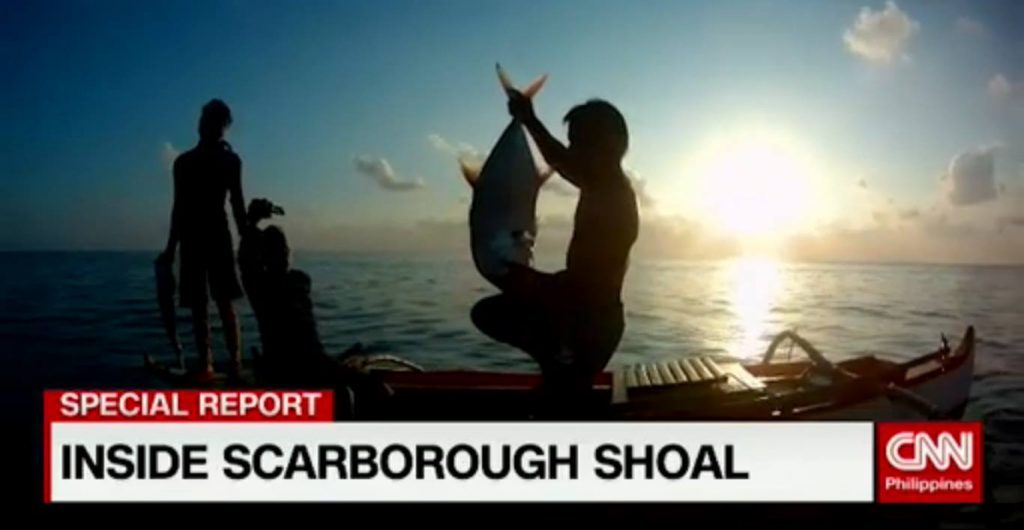Fishing in Panatag: No More Bullies

Screengrab from CNN Philippines’ website.
CHEERS TO some media organizations for keeping tabs on the situation of Filipino fisherfolk in the Scarborough Shoal (locally called Panatag Shoal), following the reported withdrawal of Chinese fishing vessels from the area.
In a 2012 standoff, China secured the shoal, preventing Filipinos from entering what has been their traditional fishing ground. In 2013, the Philippines filed an arbitration case against China to assert its sovereign rights to Scarborough and the Spratly Islands and won a favorable ruling from the Permanent Court of Arbitration (PCA) in The Hague last July 12. Chinese forces initially did not recognize the ruling and, according to reports, drove Filipino fishermen from Panatag two days after the court handed down the decision.
ABS-CBN 2’s Chiara Zambrano, CNN Philippines’ Camille Abadicio and Philippine Daily Inquirer’s Allan Macatuno joined a fishing expedition to Panatag to document the challenges that confronted locals entering the area. While the reports said no interference by the Chinese forces had occurred yet, large ships of the Chinese Coast Guard remained, blocking access to some parts of the lagoon and forcing their boats to seek another route to the waters. While they were thankful that they could now go there to fish, they remain watchful and wary of these vessels stationed there.
As a sector often ignored by the press, the fishing community deserves this attention and to be heard regarding the conditions that affect them. With President Rodrigo Duterte declaring that he would issue an executive order declaring Scarborough Shoal a protected marine sanctuary, media need to sustain coverage of this issue and to focus on the government’s response to improve the livelihood of fisherfolk.
Instructive Interview Cheers to ANC’s Nancy Irlanda for a most instructive interview with former Solicitor General Florin Hilbay on Dateline Philippines (Nov. 5). Hilbay was part of the Philippine delegation that represented the country at the hearings in arbitration court. According to him, the departure of Chinese forces from Scarborough Shoal is a form of recognition of the tribunal’s decision. However, Hilbay said that President Duterte’s “unorthodox” style in dealing with the country’s foreign relations should not risk waiving what the country had clearly won: the recognition of its sovereign rights over these territories. The president’s efforts to establish a strong alliance with China should not be achieved at the cost of the strategic enforcement of Arbitral Tribunal’s award. Hilbay also walked through constitutional issues. He explained the basis on which Duterte should pursue his “joint development” idea. Entering into contracts is allowed by law as long as the sovereign rights of the Philippines are recognized. But joint development, he said, implies recognition that China has a right to Philippine waters. Joint development of areas that have been ruled as within the exclusive economic zone (EEZ) of the Philippines is unconstitutional, including the Reed Bank, a submerged reef which is being explored for energy reserve. Joint development in that area is unconstitutional. The President, even Congress, cannot do anything about this, Hilbay pointed out. Clearly, the source had much to share with the public on an issue that had been treated by the media with more sentiment than understanding. Irlanda’s questions deftly drew out his explanations so that he could amplify the scope of issues, reflecting how well she herself had studied the subject of her interview. |
Leave a Reply